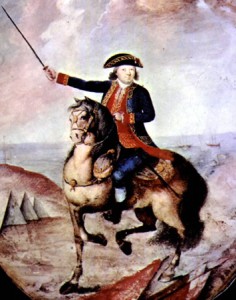America had valuable assistant from heroes like Juan de Miralles during War of Independence
By Andy Porras
That U. S. history ignores Hispanics’ role in the U.S. War of Independence is no great secret.
What it is, though, is downright disrespectful to millions of America’s Spanish-surnamed who have passed on not knowing of their ancestors’ tremendous sacrifices for this nation.
Frankly, these poor folks never really celebrated a Fourth of July fully aware that it was because of these endeavors that such a day existed in the history of their country.
But it’s about time America hears it bluntly: without Hispanic intervention at this crucial time in our country’s young life, we would not be celebrating anything on July 4th of any year.

I’m not a wagering person, but I’m willing to bet a few greenbacks that few Americans recognize some Hispanic names that helped alter the course of the American Colonies: Juan de Miralles (Trailhon), Francisco de Miranda and (Governor/General) Bernardo de Galvez.
Not to mention the fact that it was Hispanic women who raised what is the equivalent of $28 million today, in Spanish silver dollars, so that the America’s independence effort was secured.
However, these same incognizant citizens are ready to celebrate the independence of their country without really knowing much about the trials and tribulations the Father of Their Country suffered to secure their freedom.
Oh, they might tell you about the winter at Valley Forge or Gen. Washington crossing the Delaware River. But if you ask them to name names and cite examples of bravery by non-Americans that helped Gen. Washington overtake the Red Coats, they’ll be stomped.
Relax, it’s not their (or your) fault. Most, if not all, of the culpability can be found in the way U.S. History has been taught semester after semester for centuries.
“Our (history) textbooks are so Anglocentric that they might be considered Protestant history,” say Diane Ravitch and Chester E. Finn Jr. , in their book, “What Do Our 17-Year-Olds Know? A Report on the First National Assessment of History and Literature.”
That roughly translates to saying that the history taught in our schools, is fundamentally, a ‘white-man’s-history.’
The danger in adhering to such texts is that there is no room to talk about anybody else’s contributions, no matter how important they may have been. And once left out, always left out because history books, like history itself, repeat themselves. It’s cheaper to re-print than it is to research and rewrite. No matter what any school textbook executive may tell you, they’re in it for the money.
So, who was Juan de Miralles? At the time of the Revolutionary War, the Colonists possessed a ragtag military machine at best. Enter Don Juan, he a diplomat under the patronage of the French Ambassador, following the instructions of the Spanish Court.
Don Juan, a prominent and wealthy Spaniard business man living in Cuba, was a fervent defender of independence. Soon he made several visits to the American rebels in which he offered military and financial support. He was able to gain trust, and develop a close friendship with the future first president of the United States.
Don Juan immediately hit it off with the inner circle of Washington. He ended up establishing a business relationship with Robert Morris, the Philadelphia merchant who gave his fortune to the revolution and served as Washington’s principal finance minister.
Through his Cuban connections, the American army received regular and desperately needed supplies of sugar, flour, uniforms and arms. Don Juan himself lent money to several continental towns as part of the war effort against the British.
Unfortunately, in the brutal cold winter of 1779, Don Juan contracted pneumonia in Morristown, New Jersey while visiting with the troops. During his illness, he was attended by Washington’s personal physician as well as his wife, Martha. While under care at the Washington home in Morristown, the General’s amigo passed away.
After his death in April of 1780, Juan de Miralles became the first foreigner to be given a full military funeral in the United States, although the country had yet to win the war and be recognized internationally as an independent country.
Washington, deeply hurt by his friend’s demise, wrote to the Spanish governor of Cuba as well as the Miralles’ widow extolling the wonderful qualities of his newfound friend and political supporter.
Imagine, if you will, how much more today’s white -America would understand and appreciate Spanish-surnamed residents if they knew this and other parts of U.S. history that remain hidden. It boggles ones imagination how much farther this country would be in race relations at this point of our history.
As for the other personalities and accomplishments mentioned, why not invite your children to help you do the research and discover these Hispanic heroes and heroines together.
There’s nothing like knowing some real U.S. History for the remaining Fourths of July in your life.
Andy Porras is from Sacramento, lectures about Hidden Hispanic History in colleges and universities. Reprinted from LatinoLA.com